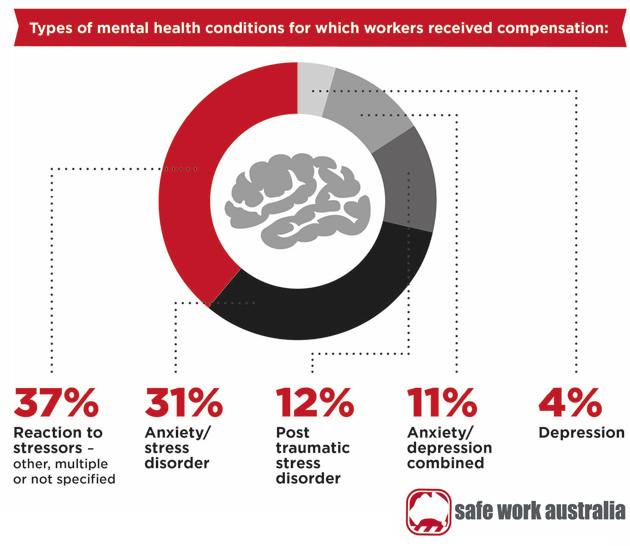
Customized mental health training workshops to suit your workplace.
Select from over a dozen off-the-shelf workplace mental health workshops,
or
tell us about your workplace and your objectives and we’ll select from a wide range of individual mental health topics and combine them into a custom workshop for you.
We provide corporate training in Sydney, Melbourne, Brisbane, Perth, Adelaide and throughout Australia, as well as online via live webinars.
Types of Workplace Mental Health Training
Workplace mental health is quite a broad subject, so we’ll help you get clear on which aspects are most relevant to your workplace so that you get the best return on investment from your training.
There are two main types of workplace mental health training.
1. Workplace Mental Health Awareness Training
This is a bit like mental health first aid. It covers the basics of:
- Identification
What is healthy and what’s not. Common symptoms - Intervention
The importance of early intervention, and how to get help - Interaction
How to communicate with someone if you have concerns about their mental health
We can also tailor this type of workshop to suit the needs of staff or the specific training needs of managers. We can also customise the training to include specific examples that are likely to occur in your workplace.
2. Workplace Mental Health Resiliency Training
This type of mental health workshop is designed to help your staff learn preventative skills and strategies to keep themselves mentally healthy.
We can either provide:
- a general overview workshop that covers the important information, or
- a more detailed training that focuses on a specific skill/strategy, such as:
- mindfulness,
- positive psychology and resilience training,
- practical skills for reducing stress,
- confidently facing challenges,
Available Training Formats
All our training can be customised to suit your workday or a specific event.
Our most common formats are:
- Single 1-hour session
- Half-day workshop
- Full-day workshop
- Monthly series of “Lunch ‘n’ Learn” classes
Our training is delivered in Sydney, Melbourne, Brisbane, Perth, Adelaide and throughout Australia, as well as online via live webinars.
1. recognise mental illness,
2. help colleagues in need,
3. maintain their own good mental health.

Benefits of Workplace Mental Health Training
There are many good reasons for providing mental health training for both your staff and managers, including:
Legal Benefits:
- Complying with government WHS Laws that require employers to provide working conditions that are both physically and mentally healthy. Providing mental health training is an important component of demonstrating that you have met this requirement.The safeworkaustralia.gov.au website states that employers “have a duty to protect workers from psychological risks as well as physical risks.” And further that they:“should intervene if they identify a psychological risk or notice a worker becoming stressed, and support a worker who has lodged a workers compensation claim while their claim is being determined. The earlier a worker is identified as experiencing work-related stress, the sooner steps can be taken to prevent a work-related mental health condition developing or an existing condition worsening.”This means that managers at all levels should be able to identify psychological risks and be alert for the main symptoms of common mental health conditions.

Having worked with HSG before I had high expectations of what I knew they could deliver and they didn’t disappoint! We put on a couple of wellness webinars for our staff and each was organised promptly, with full details and without any stone left unturned. Lisa was a fabulous help and always responded to my queries in a quick and very friendly manner. Even when one webinar didn’t quite go to plan she was quick to respond and help smooth things over which just further increased my appreciation of her and the wider HSG team. 10/10 service and would definitely recommend! A big thank you to everyone involved, including Merv and Leonie for the knowledge and tips they shared, and the general friendliness that was felt from the entire HSG team. Great job as always!
Financial Benefits:
Productivity will increase as a result of employees taking less time off work and being more engaged while at work. There may also be increased productivity due to less conflict and more co-operations among co-workers.
In 2017, a SafeWork NSW (government) report found that investing in mental health at work produced a return on investment of $2.86 for SMEs and $4 for larger companies.
The report found that 13.2% of male employees and 16.1% of female employees experienced a significant level of mental ill-health in a four-week period. That’s a percentage of any workforce that’s too large to ignore.
Some of the financial benefits include:
- Reduced Absenteeism
The number of additional sick leave days taken by employees experiencing mental illness is relatively modest, with those experiencing mild mental ill-health taking only an extra 0.5 days per year and those with worse mental health conditions taking only 0.9 days extra1. The biggest mental health cost is due to from presenteeism.
- Reduced Presenteeism
Presenteeism occurs when an employee turns up for work, but is not mentally healthy enough to perform their work to their normal standard. The SafeWork report found that the cost of presenteeism averaged $3401 per year for employees with moderate mental ill-health and $5305 for those with severe mental ill-health1.
Raising mental wealth awareness in the workplace can help these employees recognise that they need help and seek it, sooner rather than later. It can also help their managers and co-workers recognise the common symptoms and know how to communicate with them to get them help.
Raising mental wealth awareness in the workplace can help these employees recognise that they need help and seek it, sooner rather than later. It can also help their managers and co-workers recognise the common symptoms and know how to communicate with them to get them help.
- Reduced worker’s compensation claims
While workers compensation claims for mental health reasons are uncommon (less than one per thousand workers), they are expensive (averaging $68,844 each)1 and usually require long periods away from work (15.3 weeks).
About 6% of all workers’ compensation claims are for work-related mental health conditions.
91% of mental health workers compensation claims were attributed to mental stress.
41% of claims were caused by harassment, bullying or exposure to violence.

- Higher Staff Retention Rates
The cost of advertising, interviewing and training new staff can be minimised by creating a work environment that is conducive to good mental health, and training employees in the skills to handle stressful and challenging situations.
Being a Good Corporate Citizen:
These days, there’s a growing movement towards ensuring that organisations are responsible corporate citizens who treat their employees as human beings and not just disposable cogs in the wheel. Life is better when everyone feels good about what they’re doing.
In most cases, by providing mental health training to someone who needs it, you’ll not only be helping them and your organisation, you’ll also be helping their family. People take their work-related mental health problems home with them, and bring their non-work mental-health problems to work with them.
Because of the traditional social stigma and silence surrounding mental health, most people will never willingly seek help or mental health education in their private life. Therefore, the workplace is in a unique opportunity to provide this vital educational service that makes a big positive difference in many people’s lives and even gradually improve our society as a whole.
A positive workplace that ensures everyone’s wellbeing is the best breeding ground for productivity.

Components of Workplace Mental Health Workshops
Here are some of the main components from which our experienced facilitators will construct a personalised mental health training program for your workplace. We can include little bits from many areas, or we can provide an in-depth workshop focused on one particular sub-topic.
Awareness
Many people with considerable degrees of anxiety or depression don’t even realise that what they’re experiencing isn’t normal. That’s one reason they don’t seek help. The first step in workplace mental health training is to help people recognise the difference between what’s mentally healthy and what’s not, as well as to dispel common mental health myth’s. It’s also vital to provide statistics about how common mental health conditions are so that people don’t feel that what they have is unusual.
Where to Get Help
People need to know that the first steps to take are easy. And that a range of options are available so they can choose one that suits them.
How to Communicate
All employees and especially managers must know how to speak with someone who they think may need mental health support. It’s all too easy to say the wrong thing or to say nothing for fear of saying the wrong thing.
Impact of Lifestyle Choices
There are a surprising number of lifestyle choices that can have negative impacts on our mental health. For example, a habit of drinking coffee at night can produce chronic lack of sleep and increased levels of fatigue, resulting in lower tolerance to stress, which may lead to anxiety and or depression. Combine this with poor diet, and you have a potent breeding ground for mental health problems.
If you’d like us to cover lifestyle choices in depth, you might like our:

Dear Peter, Please accept our sincere appreciation for the stimulating webinar that you conducted for our Employee Wellness Week. Your willingness to share your time and expertise in the area of mental health was important to the success of this event. It was extremely informative, and the participation illustrated the importance of this topic to our staff. Since we are in the midst of this pandemic, your comments were very timely. I believe we can benefit immediately from the methods you suggested. Your enthusiasm is contagious, and we hope to use your suggestions in our pursuit of wellness. Your comments were especially helpful to those working from home. Once again, thanks very much for your participation in our Employee Wellness Week.
Stress Reduction Techniques
Mindfulness and other meditation techniques have been scientifically proven to reduce stress levels and help people maintain a higher level of wellbeing. We can provide Mindfulness and Meditation Training Workshops to teach your staff the skills they need, and then we can provide a series of Meditation Practice Classes to help your staff hone their skills and get into the habit of meditating regularly. We can also customise a more general Stress Management Training for you.
Resiliency and Positive Psychology Techniques
Resilience is the ability to deal with challenging situations and bounce back when life knocks you about. Having skills to deal with life in a positive way is a big part of being resilient.
Find out more about out Resilience and Positive Psychology workshops.

COVID19 and Work From Home
We can also tailor a workshop focused on the mental health challenges resulting from the COVID19 pandemic and the isolation and other difficulties associated with working from home.
Contact Us Today
Please contact us on 1300 889 073 or email us to discuss how HSG can deliver workplace mental health training and training for your organisation either at your premises in Sydney, Melbourne, Brisbane, Adelaide and Perth, or via live online video webinar to New Zealand, Japan, Malaysia, India, China, Hong Kong, Philippines, Singapore and other countries in the Asia Pacific region.
Other Corporate Wellbeing Services
Holistic Service Group provides a comprehensive range of workplace wellness services. Here are some of our mental health related offerings:
meditation classes, work life balance workshop, stress management workshop
You may also be interested in: Wellness Coaching & Business Coaching, Leadership training, Organizational culture change.
